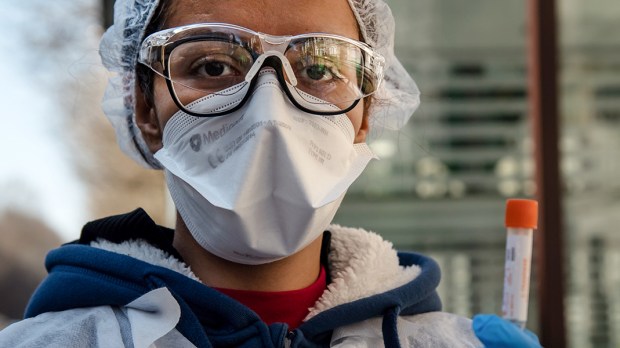During a pandemic such as the one we are living through, medical resources—beds, ventilators, medicines, blood supplies—and qualified healthcare workers are likely to become scarce.More people may have needs than there are resources to care for them.
A difficult moral question that needs to be confronted is what ethical principles should guide the allotment of scarce resources?During ordinary times the logic of “first come first serve” is a reasonable way to organize the distribution of medical resources.But in times of crisis, it is unsatisfactory.
There are many good sites on the Internet that offer instruction on the difficult question of medical rationing and disaster planning in times of a pandemic.This article has benefited from several of them.
The following reflections, including selection criteria for who gets treatment and who doesn’t, are meant to be fully consistent with Catholic teaching, although they are not to my knowledge explicitly taught in any ecclesiastical document.In particular, I have done my best to be faithful to the three bedrock Catholic social principles: the dignity of the human person, justice, and the common good.I try to get as practical as possible to assist people to think through for themselves a few dimensions of the difficult question of resource allotment.
This essay is not meant to address all dimensions of that question (e.g., who should be treated in ICU and who on the ward; whether bedside physicians should make triage decisions; criteria for the removal of life-support; hospice care referrals; space, personal and resources allotment other than critical care resources, etc.)I am only interested here in addressing the question of resource distribution for patients needing critical care.
I begin with a non-negotiable principle of good decision-making.It states that all morally unethical options for maximizing social welfare, no matter their appeal or promise, are excluded from the outset from all deliberations over what can and should be done: e.g., all forms of self-killing and assisted self-killing, aborting unborn babies for any reason, sterilizing infected populations, infecting individuals for research purposes, subjecting patients to heightened risk of infection for experimental reasons.In other words, even in crisis situations, we should reject the Utilitarian principle that evil means may be adopted in order to do the greatest good for the greatest number.
Although during a pandemic, when resources are limited, some patients will not be able to receive critical care who need it, nevertheless the dignity of the human person requires that all patients receive at least minimal care and compassion.Nobody who is excluded from critical care should be abandoned. [1]
At the basis of any selection criteria must be the principle of justice.It prescribes that nobody should be arbitrarily excluded from or entitled to limited critical care resources.“Arbitrary” here means selected for a reason unrelated to the genuine health interests of individuals and the community.Arbitrary reasons include having powerful connections, or financial resources, or political affiliation, or belonging to an undesirable population, or socioeconomic group.Another way to word this is that limited healthcare resources, especially those necessary to save lives, should be allocated fairly.
I asked my 13-year-old son whom he thought should be offered critical care resources in times of great scarcity.He said: “give them to those who are sick enough to need them, but not too sick so as not to benefit from them.”He hit the nail on the head.In the remainder of this article I will elaborate this simple principle.
I asked my 13-year-old son whom he thought should be offered critical care resources in times of great scarcity.
How should patients be prioritized?
We begin by identifying those patients who may benefit from access to critical care.For patients with active coronavirus, these will include those with respiratory failure who need ventilator support.
Looking at this wider population, we then identify three categories of patients who may be fairly excluded from care.
First, patients whose conditions are so serious that even using the critical care resources, they have a low probability of recovery. Because the same resources can be better used to assist other patients, these patients may be excluded.
Second, patients whose conditions require a level of care unavailable during pandemic times.During normal periods, they may benefit from very high levels of care, but such levels are unrealistic when resources are scarce.For example, patients who need very high volumes of blood transfusions.
Third, patients with prior advanced illnesses, whose prognosis is poor, and whose life-expectancy is short as a result of their pre-existing illnesses.For example, patients with advanced stage cancer, end stage organ failure, and advanced immunosuppressive disease; even if these patients are supplied with high levels of resources, they are likely to suffer severe complications from coronavirus are so are also justly excluded.
Finally, we set a ceiling on the amount of resources allocated to any one patient to ensure that other patients who might benefit from lesser amounts of the same resources may have access.
Applying these criteria we are able to identify a pool of patients who are sick enough to require critical care resources, who would rapidly deteriorate without them, but who are likely to recover if they are given them.
Although any exclusion measure is unfortunate, and though most doctors would find the implementation of such measures gut wrenching, the selection protocol is not unfair.It acknowledges that patients who are very sick, including those who need ICU and ventilator support, but who are unlikely to recover even if they receive them, should not be allotted resources at the expense of those who are likely to recover if given the same resources.
Among this pool of patients who are likely to benefit from receiving critical care, at least one sub-population may be prioritized: those directly involved in coronavirus management.Because they are necessary to assist larger numbers of infected patients, and because many of them subject themselves to greater risks in their work, they may be given priority in resource allotment.This includes first responders, physicians, nurses, and other healthcare workers; as well as scientists who are working on medicines, vaccines, and immunizations.
Finally, it may sound obvious, but the application of these criteria is best made by senior physicians whose training includes triage care and significant clinical experience.

Read more:
A Christian’s guide to decisions about death
~
[1] Several of the following ideas were developed from: Working Group on Adult Critical Care Admission, Discharge and Triage Criteria, Critical Care During a Pandemic: Final report of the Ontario Health Plan for an Influenza Pandemic (OHPIP); available at http://www.cidrap.umn.edu/sites/default/files/public/php/21/21_report.pdf

